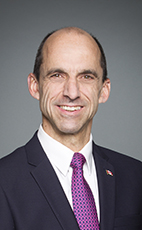Mr. Speaker, I will be sharing my time with my Franco-Ontarian colleague, the hon. member for Glengarry—Prescott—Russell.
We resume debate here today on a very important motion. It is understandable why I am so proud to show my support for the motion introduced by our Prime Minister. The motion recognizes that Quebeckers form a nation within a united Canada.
Before I go any further, I would like to clarify one thing. I must refer to a French dictionary because sometimes between French and English there are some things that are difficult to distinguish.
There are two French definitions of nation. What we are talking about today regarding this motion is that a nation is a large human community, mostly living in the same place, sharing more or less strongly historic, linguistic, cultural and economic links. This is what we are talking about today.
Of course, with respect to Quebec society.
The other nation is the one we recognize as a sovereign nation, which is Canada. Canada is a true nation in terms of a sovereign country. It is important to clarify that.
I would like to share something else with my fellow colleague. As a Québécois, when I feel respected as a Quebecker I feel even more Canadian. This is at the core, I would say, of the last 30 years of the sovereignist movement.
The aim of today's motion is deeply rooted Indeed, over the past 30 years, the sovereignist movement has grown out of disrespect for the very spirit of the Canadian federation and disrespect for Quebec's specificity. It is important to understand this. As long as we, as Quebeckers, feel respected within the Canadian federation, we will no longer necessarily feel the desire to leave.
It is not surprising that the Conservative Party is here today to properly represent and recognize Quebec's specificity. Why not? Because the Conservative Party fundamentally respects the federation, the spirit of Confederation. In other words, it recognizes that certain powers belong to the federal government and others belong to the provinces.
Often, if we really get to the bottom of things and ask sovereignists what they really want, they say they want to respect the spirit of the Canadian federation so as to ensure that the rights and privileges that belong to the provinces are respected. This includes education and various jurisdictions that are particularly vital to the protection of language.
I would also like to state that this exercise will help us to define ourselves as a Canadian nation as well. One of the fundamental characteristics of Canadian society is the distinct nature of Quebec. It is what differentiates us from Americans and other countries, for example. And it makes it possible to have a country where we can express ourselves in two languages. As a Quebecker who is also a Canadian, I am blessed by the fact that this distinct nature is recognized in the other provinces. Bilingualism is a good example of that.
Today, the motion tabled is based on a fact that I would like to highlight: Quebec's distinct nature is at the heart of the Canadian federation, and that is nothing new. It is nonetheless an important motion.
I would like to refer to the editorial in today's edition of La Presse, where Mr. Pratte writes that “the motion tabled yesterday by the Prime Minister...represents historic progress”.
Today, our Prime Minister is reaching out to all parties, including the Bloc Québécois, to obtain their support for this motion. If it is adopted, the Canadian Parliament will be giving unprecedented acknowledgement of the distinct nature of Quebec.
Today, a Conservative government has further shaped the Canadian identity by recognizing the distinct nature of Quebec.
Mr. Pratte continues:
This step forward is not an isolated step in a long series of failures, as the sovereignist version of our history portrays it. On the contrary, it is another step in an evolution that is very favourable to Quebeckers, despite a significant number of backwards steps and a great deal of frustration.
Thus, the relationship of the founding peoples is evolving and Quebeckers are finding enough space to develop and to achieve their prosperity.
Why do we have a federation here, in Canada? It is precisely to take into consideration Quebec's specificity. When we opted for that political system, back in 1867, we did not choose a unitary system. We opted for a confederal system, in which the provinces are responsible for certain jurisdictions. So, this respect for Quebec's specificity is at the core of the Canadian system.
Moreover, as we know, in Quebec we have notaries, and we use the civil law, which is based on the famous Napoleonic code. We also have school boards, and Quebec justices who sit on the Supreme Court. So, there are many examples which illustrate that Quebec is recognized and that it has its own place within the Canadian federation. This vision is fundamentally different from that of opposition colleagues, particularly Bloc Québécois members.
The Conservatives are proposing that the Quebec nation, that Quebeckers fully recognize themselves within the Canadian federation. We do not want the narrow vision of a self-centred nationalism but, rather, a federalism that is open, for example, to other francophone minorities across Canada.
I am taking this opportunity to salute the Quebec government for its initiative, for reaching out to the other francophone minorities and trying to provide support as well as a framework to these primary safeguards of the French language.
The real question today is: Does the presence of a sovereign party in this House help Quebec, does it ensure that Quebec becomes a more prosperous society? That is the real question behind today's motion. And we should ask ourselves that question.

